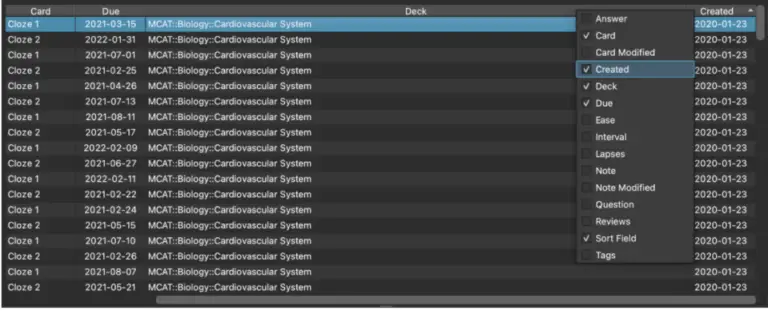
In contrast, when you do use Anki with the right process, you could gain tremendous advantage over the competition: This means that if the first two-thirds of the system you use for studying - encoding & storage - is messed up, then using Anki won’t be the magic pill that it’s believed to be. Why? Because Anki covers just the final one-third of the memory’s core processes for information encoding 1 - which is retrieval. That is, Anki works by supplementing your study process.Īs good as it is, it’s NOT a magic pill nor a substitute for poor learning skills. Real Talk: What is Anki? How does it work?Īs you may know, Anki is an open-source flashcard app that uses spaced repetition algorithms to help you prevent natural forgetting.Įven if you’re not born with awesome recall skills, Anki can help you to intentionally commit information into long-term memory. Overall, the goal of this guide is to make you a decent Anki user in the fastest way possible. Redditors seem to agree: The very first version of this article was read by thousands of people from Reddit - awesome guys out there. You want a guide that’s Lean, rather than filled with information you can’t readily use.

#ANKI MCAT APP MANUAL#
The Anki manual is helpful, but it’s an app documentation rather than a quick-start guide. You only need to get better at using the ESSENTIAL controls to be able to start driving it. You don’t start driving a car by studying the ENTIRE manual.
#ANKI MCAT APP HOW TO#
It’s much like learning how to drive a car:

Now, this guide exists because I believe you just need to learn the few core info if you’re just looking to start.
#ANKI MCAT APP SOFTWARE#
#ANKI MCAT APP FREE#
Still not convinced? You can read some other reasons for why and tips on how to use flashcards more effectively.Hi, this is Lesson of 4 in the Anki Fundamentals free course. Once you know the answer or concept on the flashcard, set it aside so that you can continue working through the content that you are not as familiar with. Although flashcards encourage retention through repetition, you still want to be challenging your mind. You need to mix up the cards so that your brain doesn’t anticipate what flashcards come next. The key to these flashcards is repetition to encourage retention! Mix it up:

Feel free to keep these flashcards on you, so that you can refer to them wherever you are. Sticking to a schedule that will allow you to review your MCAT flashcards daily, if even for a few minutes is necessary. We encourage interval studying, as long periods of time straining on material can actually do more harm than good.

After a 10-minute break, go back into studying. We recommend aiming to use your MCAT flashcards for a maximum of 20-30 minutes before taking a break. Start with some of these MCAT flashcard tips: Study for short intervals: Perhaps you just received your MCAT flashcards or even made them yourself and you’re wondering how to start using them. Either you are going to or are already using flashcards for your MCAT prep.


 0 kommentar(er)
0 kommentar(er)
